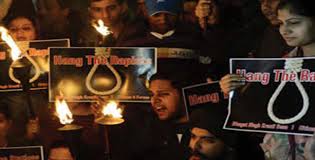
Additional Public Prosecutor Dayan Krishnan sought death penalty for the attackers, saying they only deserve "death sentence" for the brutal crime.
Defence counsel, however, vehemently opposed the death penalty, saying "the factors outside the court room have effected the trial of the case".
The court Tuesday while convicting the four men, called the crime "premeditated" and "brutal".
It convicted the four men for gang raping the 23-year-old woman, inflicting grave injuries on her, and leaving her to die by a roadside on a cold Dec 16, 2012, night in an abhoring case that jolted the nation and made global headlines.
Additional Session Judge Yogesh Tuesday said the injuries on the victim, including "18 injuries" to her internal organs, inflicted by the accused were "dangerous" and "sufficient...to cause death".
The court said the convicts' act of inserting a rod into the body of the victim was done "intentionally" to kill her.
The gang rape occurred after the woman and her male companion boarded the bus in Munirka in south Delhi to return home after watching a movie.
The six attackers in the bus threw both the woman and her male companion out of the vehicle -- without clothes -- on the street in the cold December night after committing the crime, police said.
The woman died of her injuries Dec 29 at Singapore's Mount Elizabeth Hospital.
One of the six accused was found dead in a cell in Delhi's Tihar Jail while a juvenile involved in the crime was Aug 31 sent by the Juvenile Justice Board to a reform home for three years.
The incident sparked nationwide protests and nudged the central government into enacting a stringent anti-rape law.






Comments
Add new comment